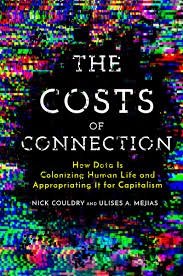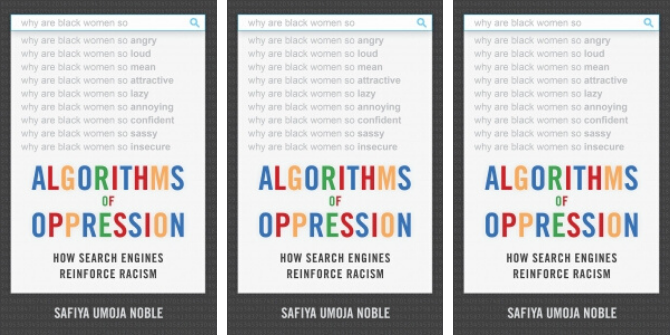In The Costs of Connection: How Data is Colonizing Human Life and Appropriating It for Capitalism, Nick Couldry and Ulises A. Mejias argue that the quantified world is not a new frontier, but rather the continuation and expansion of both colonialism and capitalism. This book shines in using the theory underpinning the idea of data colonialism to articulate sites of resistance, writes Laura Carter.
The Costs of Connection: How Data is Colonizing Human Life and Appropriating It for Capitalism. Nick Couldry and Ulises A. Mejias. Stanford University Press. 2019.
 Find this book (affiliate link):
Find this book (affiliate link): ![]()
The age of Big Data has frequently been framed as a new frontier in human life, presenting both brand new opportunities and brand new challenges. In The Costs of Connection, Nick Couldry and Ulises A. Mejias articulate an alternative view: the quantified world in which we now live is a product of the continuation and expansion of both colonialism and capitalism: not a new frontier, but the inevitable expansion of an existing one.
Drawing parallels with historical colonialism, Couldry and Mejias argue that our relationship with data today is one of ‘data colonialism’: ‘the appropriation of human life so that data can be continuously extracted from it for profit’. Just as historical colonialism appropriated land, bodies and resources in order to extract value, so too is data colonialism appropriating human life through quantification. And just as historical colonialism rationalised its violence through ideologies of ‘civilising’ the world, the ‘superiority’ of the colonisers over the colonised and the need to make use of ‘natural’ resources, so too is data colonialism rationalising its constant accumulation of data by framing it as ‘connection’, ‘personalisation’ and ‘democratisation’.
The authors point to the emergence of the ‘social quantification sector’ as a key driver of data colonialism. While, they argue, the collection of social data and statistics dates back to the nineteenth century, the ‘big five’ technology companies – Amazon, Apple, Facebook, Google and Microsoft – have taken the quantification of the social to new levels. They collect data about us continuously, opaquely and for the purposes not of understanding our world but of predicting our behaviour: specifically, targeting us as consumers. While the ‘big five’ are all US-based technology companies, they – and their smaller competitors, mostly based in the US or China – increasingly work more and more closely with governments, exerting an unprecedented level of social control.
Image Credit: Photo by Joshua Sortino on Unsplash
In contrast to other recent authors who see this collection of data for profit as a new type of capitalism – see, for example, Shoshana Zuboff’s The Age of Surveillance Capitalism – Couldry and Mejias argue that what is taking place under data colonialism is merely the extension of capitalism as it has developed over the last two centuries: the organisation of life to extract maximum value, and the resulting concentration of power and wealth in the hands of a small number of individuals. They argue that just as capitalism turned the human activity of work into the commodity of labour, data colonialism is turning human life into the commodity of data. Just as capitalism exerted and continues to exert its power to shape the world in order to maximise profits, data colonialism is exerting its power to shape the world to generate data.
Couldry and Mejias argue that for their analysis, colonialism is not acting as a metaphor, nor are they taking a neo-colonial or postcolonial approach. Instead, they draw a direct line through the extraction methodology of historical colonialism to that of data colonialism. The authors acknowledge the history that they draw on, looking both at the Global North and the Global South and showing how data colonialism interacts with the sharply unequal legacies of historical colonialism, allowing the benefits to accrue to the already-powerful, while visiting the harms on those who are already marginalised. However, the book would have benefited from more acknowledgement that data colonialism is crucially different from historical colonialism in that it is not inherently built on and maintained through violence. Rampant inequality as well as surveilled and underpaid workers are both abhorrent, not to mention harmful, but they are not directly comparable with, for example, the violence of slavery.
The Costs of Connection presents a dystopian view of our capitalist future under data colonialism: the authors argue that the colonialist model of ‘explore, expand, exploit, and exterminate’ will incentivise corporations to collect more and more data – and force submission to surveillance as the price of participation in daily life – until the boundary of the self is eroded and there is no space left for the ‘self’ to call its own. This vision perhaps owes more to the hype of the social quantification sector than the authors admit. They rightly point out that voluntary submission to self-tracking devices and other manifestations of the ‘quantified self’ reflect an idea that external systems know us better than we know ourselves. They also accurately note that, more and more often, decisions – about not just which advertisements to show, but about who is entitled to social care and welfare benefits – are taken on the basis of a collection of data points, not on an individual. But it does not automatically follow that human autonomy is erased: rather, it seems more likely that the result is an increasing disconnect between a person’s autonomous self and the space that they are allowed to occupy in the world. This remains a problem, but it is not quite so dystopian as the authors would argue.
Where the book shines is in using the theory underpinning the idea of data colonialism to articulate sites of resistance. The parallels between historical and data colonialism allow the authors to show how a decolonial approach can be used. They note that individual decisions to avoid the social quantification sector are not sufficient, nor are alternative platforms. The key insight of the book, for me, is the recognition that as well as technological, economic and practical developments, the data ecosystem as it exists today in its colonial form relies on ideologies. Amongst these are the ideas that data is a ‘natural resource’ that is ownerless and which requires skills and resources that can only be deployed by the technology companies, as well as the notion that this must be done in the service of ‘building communities’, making it easy to ‘share’ with one another, ‘personalising’ the digital services we receive and ‘democratising’ participation in a new social order.
As a result, the authors argue, in order to resist data colonialism, we must challenge its underpinning ideologies: as well as media literacy programmes to understand how digital systems work, and regulation to curb the most obvious of the sector’s excesses, we must reject the ideology that the constant collection of data is somehow a rational way to live. Instead, Couldry and Mejias argue, we must develop alternative presents and futures in which we can not only exist but thrive: new worldviews which allow for genuine pluralism, new forms of social relations and new spaces – outside of quantified data systems – for solidarity and genuine connection.
Note: This review gives the views of the author, and not the position of the LSE Review of Books blog, or of the London School of Economics and Political Science. The LSE RB blog may receive a small commission if you choose to make a purchase through the above Amazon affiliate link. This is entirely independent of the coverage of the book on LSE Review of Books.









2 Comments